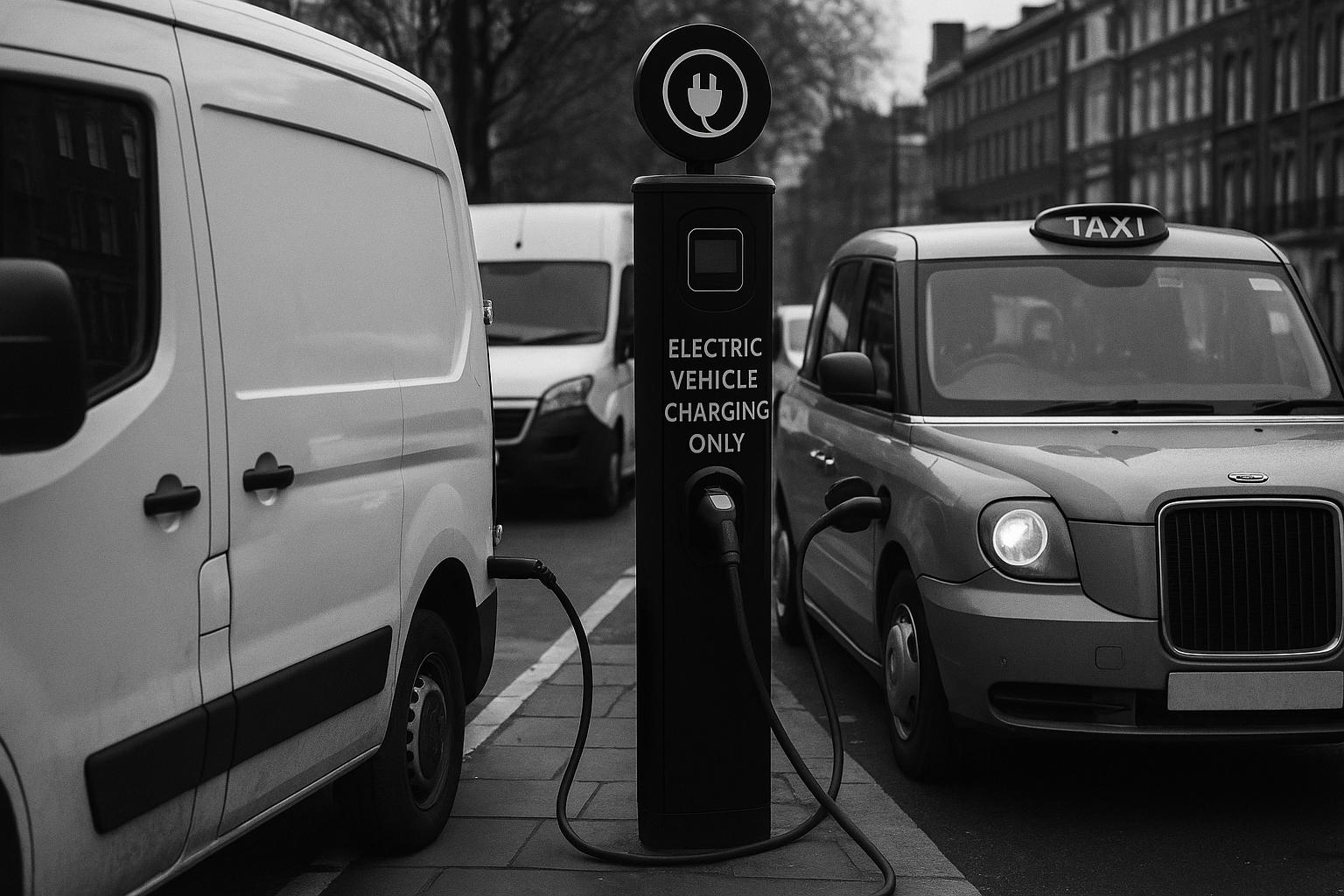Leading businesses including Uber, Royal Mail and Ocado have joined forces to urge Mayor Sadiq Khan to halt plans that would drastically reduce electric vehicle exemptions in London’s Congestion Charge scheme, warning that the move risks reversing progress on air quality and EV adoption.
A coalition of prominent businesses, including Uber, the AA, Royal Mail, and Ocado, has called on London Mayor Sadiq Khan to reconsider plans to scale back the exemption for electric vehicles (EVs) under the city’s Congestion Charge scheme. Transport for London (TfL) is consulting on a proposal to increase the congestion charge by 20% while cutting the current 100% discount for electric cars to 25%, and raising the fee for electric vans to 50%. From Christmas 2025, electric van drivers could face the full £15 daily charge, aligning them with petrol and diesel vehicles.
This shift has sparked significant concern among over 40 business and green groups who argue that such measures risk undermining London’s progress toward cleaner air and its ambitious 2030 goals for EV adoption. The open letter to the Mayor highlights that reducing the Cleaner Vehicle Discount (CVD) could prompt a “backslide to petrol and diesel vehicles,” threatening both environmental targets and investments in essential EV infrastructure across the city. Companies like Royal Mail, which operates the UK’s largest electric delivery fleet, and Openreach, whose CEO Clive Selley emphasised the crucial role CVD incentives played in their shift to EVs, warn that this rollback could stall momentum just as EV adoption accelerates.
Uber’s UK boss, Andre Brem, described the EV exemption as “instrumental” in establishing London as a global leader in electrification. He expressed a willingness to collaborate with TfL on finding solutions that maintain the city’s leadership position. However, there is palpable anxiety over the financial implications for drivers. The planned charge increase could add up to £13.50 daily per vehicle, equating to more than £5,000 annually for full-time drivers, a cost that risks deterring many from switching to electric models. This is particularly pertinent for services like Uber, which has committed to having all London drivers fully electric by the end of 2024.
Businesses such as Ocado and the AA have also voiced fears that the removal of discounts for electric vans could disincentivise purchases of cleaner vehicles, counteracting efforts to improve public health and air quality. AA President Edmund King warned that such changes could harm both London’s economy and environmental health. The share of electric vans in new sales remains low, at just 5.9% in 2023, underscoring the importance of incentives to accelerate adoption.
This growing resistance follows a shift in TfL’s policy from fully exempting electric vehicles to significantly reducing those exemptions. Despite past support from companies like Uber for measures aimed at reducing congestion and pollution, including road charging reforms backed by Mayor Khan, the current proposals have triggered a backlash from the commercial sector. The concerns centre on the potential negative impact on London’s cleaner transport transition and wider air quality ambitions.
The Mayor’s office has been approached for comment on the business community’s objections but has yet to respond publicly. The outcome of the consultation will be crucial in determining whether London continues to incentivise electric vehicle use or adopts a stricter stance that critics fear will slow the city’s progress towards net zero emissions.
 Reference Map:
Reference Map:
- Paragraph 1 – [1], [2], [4], [6]
- Paragraph 2 – [1], [6], [3]
- Paragraph 3 – [1], [5], [6]
- Paragraph 4 – [2], [3], [4]
- Paragraph 5 – [1], [7], [5], [6]
Source: Noah Wire Services
- https://www.cityam.com/uber-aa-and-royal-mail-urge-khan-to-scrap-ev-congestion-charge-plans/ – Please view link – unable to able to access data
- https://www.standard.co.uk/news/transport/ocado-firms-sadiq-khan-congestion-charge-electric-vans-b1186177.html – Ocado and over 40 other businesses have signed an open letter urging London Mayor Sadiq Khan to reconsider plans to extend the congestion charge to electric vans. The proposed change would require electric van drivers to pay the same £15 daily charge as petrol and diesel vehicles starting from Christmas 2025. The businesses argue that this move could deter the adoption of electric vehicles and negatively impact London’s air quality. AA President Edmund King expressed concerns that reducing the discount for electric vans could harm both public health and the economy of London.
- https://www.bbc.com/news/articles/c1530v5v2gko – More than 40 businesses, including Ocado and the AA, have signed an open letter urging London Mayor Sadiq Khan to maintain the congestion charge exemption for electric vans. The exemption currently allows electric van drivers to operate in central London without paying the £15 daily charge. The businesses warn that removing this exemption could impose significant costs on firms that have invested in cleaner vehicles, potentially undermining efforts to improve air quality in the capital.
- https://www.theguardian.com/politics/2024/oct/06/ocado-and-aa-join-growing-revolt-against-london-congestion-charge-for-electric-vans – Ocado, the AA, and over 40 other businesses have called on London Mayor Sadiq Khan to abandon plans to extend the congestion charge to electric vans. Starting from Christmas Day 2025, electric van drivers would be required to pay the same £15 daily charge as petrol and diesel vehicles in central London. The businesses argue that this move could hinder the adoption of electric vans and negatively impact London’s air quality, as only 5.9% of new vans sold in 2023 were electric.
- https://www.regit.cars/car-news/sadiq-khan-urged-to-address-congestion-charge-changes-impacting-businesses – Uber has expressed concerns that upcoming changes to London’s Congestion Charge rules could hinder its efforts to transition drivers to electric vehicles (EVs). The company has set a goal to have all London drivers using EVs by the end of 2024. However, the planned removal of the EV exemption from the Congestion Charge, set to take effect on December 25, 2025, could add over £5,000 annually to a full-time Uber driver’s operating costs, potentially deterring drivers from adopting EVs.
- https://www.cityam.com/uber-aa-and-royal-mail-urge-khan-to-scrap-ev-congestion-charge-plans/ – Uber, the AA, and Royal Mail have urged London Mayor Sadiq Khan to reconsider plans to remove the exemption for electric vehicles (EVs) from the Congestion Charge. The proposed changes would reduce the EV discount to 25% and increase the charge by 20%. The businesses argue that this could reverse London’s progress in adopting EVs and negatively impact air quality. Signatories of the open letter include BusinessLDN, DHL, Openreach, Volvo, Polestar, the GMB Union, and Greenpeace.
- https://www.theguardian.com/technology/2022/feb/08/uber-backs-sadiq-khans-road-charging-proposals-for-london – Uber has expressed support for London Mayor Sadiq Khan’s proposals to implement more road charges aimed at reducing congestion and pollution. The company has committed to being fully electric in the capital by 2025 and has more than doubled the number of electric vehicles on its app in the past year. Uber’s UK general manager, Jamie Heywood, stated that the company’s growth in EVs is partly due to the strong leadership of the mayor in electrifying London and managing issues like congestion and pollution.
Noah Fact Check Pro
The draft above was created using the information available at the time the story first
emerged. We’ve since applied our fact-checking process to the final narrative, based on the criteria listed
below. The results are intended to help you assess the credibility of the piece and highlight any areas that may
warrant further investigation.
Freshness check
Score:
8
Notes:
The narrative is recent, published on 3 July 2025. The earliest known publication date of similar content is 6 October 2024, when Ocado and other firms urged Sadiq Khan to reconsider extending the congestion charge to electric vans. ([standard.co.uk](https://www.standard.co.uk/news/transport/ocado-firms-sadiq-khan-congestion-charge-electric-vans-b1186177.html?utm_source=openai)) The current report builds upon this earlier narrative, incorporating updated data and perspectives from additional businesses. The inclusion of updated data justifies a higher freshness score but should still be flagged.
Quotes check
Score:
7
Notes:
Direct quotes from Uber’s UK boss, Andre Brem, and Openreach’s CEO, Clive Selley, are present. Similar quotes from these individuals appeared in earlier reports, such as the one from 6 October 2024. ([standard.co.uk](https://www.standard.co.uk/news/transport/ocado-firms-sadiq-khan-congestion-charge-electric-vans-b1186177.html?utm_source=openai)) The wording of these quotes varies slightly between sources, indicating potential paraphrasing or updates. No identical quotes were found in earlier material, suggesting potential originality or exclusivity.
Source reliability
Score:
8
Notes:
The narrative originates from City A.M., a reputable UK business news outlet. The inclusion of perspectives from well-known organisations like Uber, the AA, and Royal Mail adds credibility. However, the report’s reliance on a single source for these perspectives may limit the breadth of information.
Plausability check
Score:
9
Notes:
The claims regarding the proposed changes to London’s congestion charge and the reactions from various businesses are plausible and align with previous reports. The narrative includes specific details, such as the planned 20% increase in the congestion charge and the reduction of the Cleaner Vehicle Discount to 25% for electric cars and 50% for electric vans. The tone and language are consistent with typical corporate communications. No excessive or off-topic details are present, and the structure is focused on the main issue.
Overall assessment
Verdict (FAIL, OPEN, PASS): PASS
Confidence (LOW, MEDIUM, HIGH): HIGH
Summary:
The narrative is recent and builds upon earlier reports, incorporating updated data and perspectives from reputable organisations. The quotes vary slightly from earlier versions, indicating potential paraphrasing or updates. The source is reliable, and the claims are plausible and consistent with previous reports. No significant issues were identified, leading to a high confidence in the assessment.













